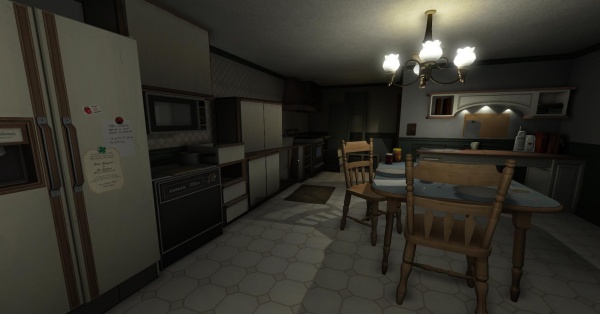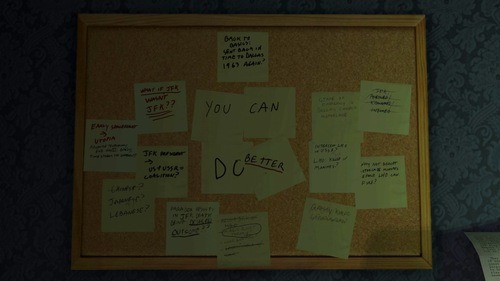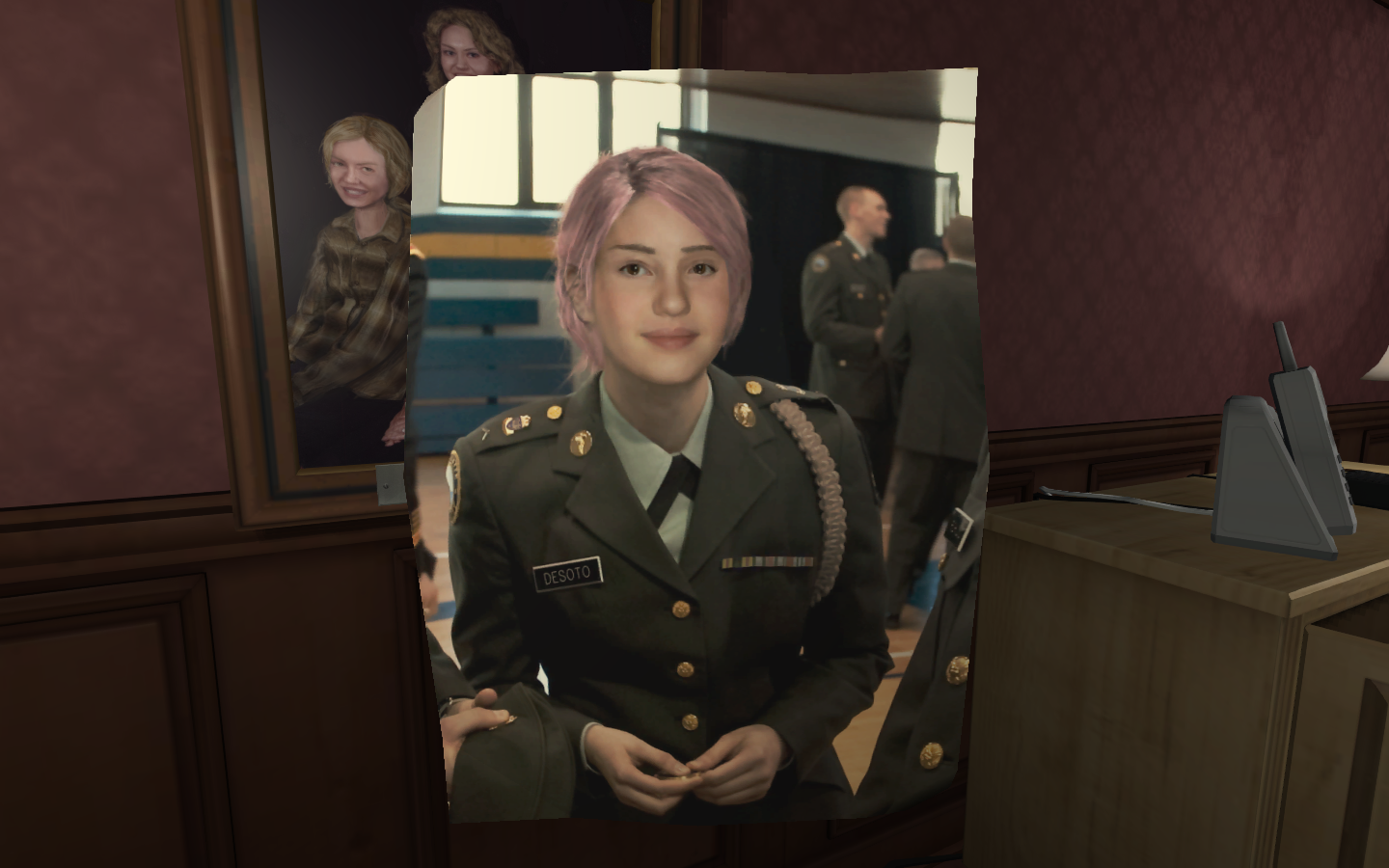Gone Home is not nearly as groundbreaking as everyone makes it out to be. In 2013, Game of the Year was a controversial subject among gamers because that independent title called Gone Home won multiple Game Of The Year Awards from various sites and acclaimed video game journalists. Not only that, but the game has been given praise from those who believe that because of the sensitive romance portrayed in story, it has no flaws.
When a game is lauded with such praise one would expect to be blown away by the experience they were given, not sit in an apathetic stupor by its end saying: “That’s it?”
$20 is too high of a price for the little you get.
According to the Hollywood Reporter as of 2014 the average price for a movie ticket from the first financial quarter, is $7.96 with movies being around 90 minutes to 120 minutes. If Gone Home resembles anything, it’ s a film for how it is structured throughout the narrative of the story. In order to complete the game, unlocking every aspect of the story and otherwise, it’s only around 3 hours. Which means that a player is paying twenty dollars to go see a three-hour movie, just for themselves, without bringing anyone else with them.

Short games aren’t always a bad thing especially if they have a lot of replay value, but once you’ve beaten Gone Home once (whether or not you’ve found all the secrets) it’s not likely you’ll play it again. You know the story and that’s the biggest draw that people have to a game like Gone Home.
There are always the Easter Eggs you can find, but even then it doesn’t really add anything else. It just seems like a waste of money because while a game doesn’t need replay value to be good, it does need to offer you something that makes you want to pay the full price for a game you’d only want to play a few times.
Gone Home doesn’t do that.

Dear Esther is cheaper and offers more to you than Gone Home does.
The game’s price would be much more reasonable if it was $10 similar to another popular narrative game: Dear Esther. The main difference between the two being that Gone Home is the same experience every time you play it, Dear Esther tries to give you a unique experience every time with dynamic elements of the game while retaining a similar story.
The atmosphere is very misleading
If there is one thing about Gone Home that was very enjoyable it was that it created its atmosphere very well, constructing an old deserted house trapped in a perpetual time warp of the 90’s. Of course, with it being stuck in the 90’s this also means that it panders hard to 90’s crowd.

Look a Super Nintendo Cartridge! See, 90’s!
Which it did successfully judging by how many reviewers compliment on this rather than addressing the one problem with the atmosphere. It also constructs a very believable horror environment that really builds up the incoming terr-
“Oh wait it’s not’s a horror game?”
While I did love the atmosphere they set up in Gone Home, it was really misleading. The story has almost nothing to do with horror except for an underdeveloped plot point which I will get to later. The game is built up with a horror aspect because you are dreading what has happened to your sister. What’s distracting is that it feels like the game doesn’t want to just be a narrative exploration game like advertised in the trailer, but an unsettling suspense game as well.

Some may not see it that way, but the way that everything was set up in the game made it seem like a horror game. It was just distracting from the overall feel of the game and made certain moments less impactful. The game needs to pick a semi consistent tone and stick with it instead of jumping around as much as it did.
None of these characters are as developed as they should be

I’ve had groups of Sims that have more personality and backstory than these characters and this is a game with an actual story.
Gone Home is constantly praised for the brilliant characterization of the members of the Greenbriar family and I have no idea why. I know it’s not the family’s story as much as it is Samantha’s but they have to develop this family a little more. I’ve had groups of Sims that have more personality and back story than these characters and this is a game with an actual story. In a way it unsettling resembles Twilight in the fact that it, doesn’t develop any characters outside of the one in the romantic relationship. The other characters reek of potential and yet fall short due to the focus on what should have been more well-rounded tale.
Let’s discuss each of these characters and what aspects of them needed more fleshing out:
Katie Greenbrair: She just came home from being abroad and arrives at an empty household. From what little can be perceived from what you find around the house, Katie was your typical 90’s movie protagonist. Katie gets little to no development throughout the entire game having her serve as a decoy protagonist. While this can work, it’s still a little disappointing that we don’t find much out about Katie. She’s just there to be a sounding board for everyone else’s story, which is disappointing.

I would have liked to see her develop more as she learned more about Sam’s life. We did get to see her go “Ugh.” and Gross.” when reacting to certain things but that really wasn’t enough. How are we supposed to get behind this family if the very family member we are playing as has as much personality as a cardboard cutout of a 90’s kid?
Janice Greenbriar: Janice’s entire character seems to focus around on how she’s a ranger, how unhappy she is in her marriage and that she doesn’t think Samantha is a lesbian. Her characterization isn’t much more than a clichéd mess of a mother character. I would like to see more of who she was and why she reacted the way she did to Samantha other than.“People weren’t as accepting back then.”There’s always a lot more of a reason for people act the way they do than just a simple statement.
I’d like to have seen more of the family dynamic between her and Sam or even mentioning’s of her and Katie’s relationship. Something that really hammers in just who she is because now she’s just an unhappy mom who is opposed to lesbianism and that’s not good enough.
Terry Greenbrair: Other than Sam, Terry gets the most development throughout the game but that doesn’t mean much. We find out he’s a writer who isn’t doing well at the moment. He hasn’t been writing as well as he did with his first book, which causes a lot of financial issues within the family. We also find out that the house used to belong to his uncle and the development around that story really deserved some spotlight. It’s fully analysed here and a confirmation of this analysis was placed here.

It isn’t covered much in the media today but Terry was molested by the uncle that used to live in this house, so being there all the time must not have been easy for him. While I would never want to take away from another characters story, I did want to see more focus on Terry when I put all the puzzle pieces together. Maybe an entry about it in Sam’s many diaries? It’s disappointing to see any character glossed over especially when a revelation like that comes to light.
Samantha Greenbrair: Samantha is the real main character of the story, she’s what the entire narrative focuses around and her disappearance is what sets off the story of her life since Katie’s been gone in motion. We learn that she goes to school, doesn’t fit in, meets a girl, and falls in love and then runs away with her.
This is character development but not nearly enough to make Samantha more than clichéd stereotype. We learn about Samantha outside of all of this. We learn she wants to write, watches tv and plays video games. Other than that, her entire character arc focusses on Lonnie, her girlfriend. Her entire life just becomes enveloped in the idea of having this romance.

Samantha doesn’t develop as much she stagnates in a state of teenaged rebellion amidst her high school romance. Romantic relationships aren’t a bad thing to have with a character in a video game and can be done very well. But it’s when character entirely focusses on just that relationship is what makes it a badly written character.
She’s passionate and fiery about Lonnie but she just doesn’t become more than teenager in love which has been done before and while representation of the LBGT community is wonderful, no romance should be written like this. The romance presented perpetuates the romanticism of unhealthy obsessive relationships portrayed in the Twilight Series and now 50 Shades of Grey.
If all of the family members were far more developed than what was presented to us through visual storytelling and Lonnie’s diary entries, I understand part of the reason people gave this game as much praise as they did. But as it stands, these characters are very dry and resemble the stereotypes 90’s time period they are stuck in rather than actual people.

A game like Three Fourths Home which I reviewed recently, gives far more character development to an entire family within an hour of gameplay than this game did in 3 hours.
Gone Home had a lot of ambition but didn’t deliver on what was advertised
In the above trailer of Gone Home, it shows all of the praise the critics have given it, including IGN calling it a “Remarkable Achievement.”
The definition of remarkable is worthy of attention or striking, which is an interesting way of talking about this particular game. Gone Home doesn’t do anything differently than other games of this genre or any form of medium of that matter. It is a story about a girl, coming home to find her sister is missing and then pieces together what has happened.
If you look up almost any mystery novel or game for that matter, you’re going to get the same thing. Think of a game like Trace Memory, where you are looking for your father on a deserted island and you put together what happened to him. All of the characters are developed and the subplot is solved, the game is just an hour long and wasn’t even full price when it came out on the DS. 
It left plot points that should have been important by the wayside.
Gone Home doesn’t even solve its strange paranormal sub plot that was going on throughout the entire game. It left plot points that should have been important by the wayside. What’s the point of mentioning a lot of these things if you aren’t going to elaborate or explain them?
I understand that sometimes implications of aspects of stories can be better without explaining the entire thing, however, when you just leave several hanging plot threads at the end of a game it leaves player unfulfilled. An abrupt ending is one thing, but several unresolved plotlines is something else entirely.

Speaking of the ending, I’d really like to address how this game ends. Lonnie, who’s 18 gets off the bus going to boot camp for the military and goes to get Sam so they can run away together. Now while this is a typical ending to a romantic story, allow me to slap some reality on to this. Lonnie is probably going to go prison because she just went AWOL on the military and Sam’s parents who we know don’t fully accept her sexuality will probably accuse Lonnie of kidnapping Sam because she’s a minor.

I can’t wait to see the inevitable trial that Sam and Lonnie will have to go to when Lonnie is arrested for going AWOL.
This abrupt “Happy Ending” for this game was a big part of what really killed the story for a lot of people, myself included. The game ended up more like a romantic film than anything else, and that was a little jarring considering the tone for aspects of the game. This was another aspect that resembled the infamous Twilight Saga in a way, giving us a non committal ending to what should have been a fulfilling finale. It wasn’t the kind of ending that really sealed this games story. While you don’t always need closure for an ending, having an ending as outlandish as this, while the rest of the story really attempted to stay grounded in reality is just poor writing.
Is Gone Home a bad game?
No, it just has a lot of problems that many seem to overlook. I’m all for increasing awareness to sexualities that don’t get as much exposure in the media. I appreciate Gone Home’s attempt at focusing on this.
However, Gone Home executes it very poorly, making what should have been a well-developed story about a girl coming out to her slowly fracturing family into a badly written melodrama. There is really no reason to give Gone Home the title of Game of the Year not because it’s “not a game” as so many like to point out, but because the very thing it prides itself on, it’s story and characters, is a broken mess.






Published: Aug 6, 2014 10:08 am